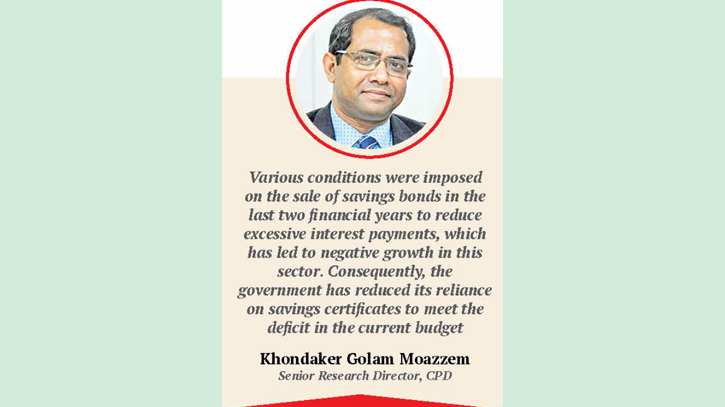
Photo : Messenger
People were once interested in investing in savings bonds rather than bank deposits in the hope of higher returns. However, in September 2021, interest rates on all types of savings certificates were reduced. Since then, investment in savings bonds has been steadily declining. In September of the same year, the government's liability from savings bonds reached a negative Tk 147.85 crore.
According to the data from the latest update report of the Directorate of National Savings, savings bonds worth Tk 6,745.79 crore were sold in September. Out of this amount, Tk 6,893.64 crore has been paid as the previous principal and profit. In other words, the government's net debt in this sector stood at a negative Tk 147.85 crore in September.
Observers have noted that the government has imposed various conditions on savings certificates to reduce interest expenses. As a result, investment in the sector has turned negative. Additionally, the government has also reduced its reliance on savings certificates to cover the deficit in the budget for the current fiscal year 2023-24.
Meanwhile, in the first three months (July-September) of the current financial year, savings bonds worth Tk 21,656.05 crore were sold. Out of this amount, the previous principal and profit paid reached Tk 22,921.02 crore. After paying the principal and profit, the government's net debt stood at a negative Tk 1,264.97 crore over the three months. In the same period of the previous financial year, the net sale of savings bonds was Tk 330.57 crore.
It's important to note that investors receive profits from savings bonds, but this sale effectively represents a loan to the government. To secure this loan from the public, the government must charge a high rate of interest. In September 2021, the government reduced the interest rate on savings bonds through an official notification. The Internal Revenue Department (IRD) introduced several tiers in the same notification. Since then, investment in savings bonds has been declining.
Economists have mentioned other reasons for the decline in investment in savings bonds. For instance, every customer must submit an income tax return if purchasing savings bonds worth more than five lakh taka. The Bangladesh Bank has instructed banks to follow the Finance Act for investments exceeding five lakh taka in savings bonds and post office savings banks. Furthermore, even for deposits exceeding 10 lakhs taka in a bank, one must provide proof of the deposit's origin.
In this regard, Khondaker Golam Moazzem, Senior Research Director of the Center for Policy Dialogue (CPD), told The Daily Messenger, “Various conditions were imposed on the sale of savings bonds in the last two financial years to reduce excessive interest payments, which has led to negative growth in this sector. Consequently, the government has reduced its reliance on savings certificates to meet the deficit in the current budget.”
Meanwhile, the government has set a target of borrowing Tk 18,000 crore from the sale of savings bonds in the fiscal year 2023-24. This amount is Tk 17,000 crore or 48.57 percent less than in fiscal year 2022-23 when the target was set at Tk 35,000 crore for borrowing from savings bonds.
Analyzing data from the last five fiscal years reveals that the government borrowed a net loan of Tk 46,530 crore from savings bonds in fiscal year 2017-18. In the following fiscal year, 2018-19, the net debt increased to Tk 49,939 crore. Moreover, the government borrowed Tk 14,428 crore in FY 2019-20, Tk 41,960 crore in FY 2020-21, and Tk 19,916 crore in FY 2021-22.
Meanwhile, starting from September 21 of last year, the government reduced the interest rate on all types of savings certificates to 2 percent for investments exceeding 15 lakh taka. Before this change, in December 2020, the savings-investment limit was also reduced. Additionally, the withholding tax rate on profits increased from 5 percent to 10 percent as of July 1, 2019. A customer information database has been established to prevent corruption or the purchase of savings certificates using black money.
It's important to note that there are currently four types of savings certificates available. The interest rates are as follows: a five-year family savings bond offers 11.52 percent, a five-year pensioner savings bond provides 11.76 percent, a five-year profit-based savings bond yields 11.28 percent, and a three-year long and three-month profit-based savings bond returns 11.4 percent. Despite several reductions in the interest rates on savings bonds, they still offer higher returns compared to those of banks.
Messenger/Disha








